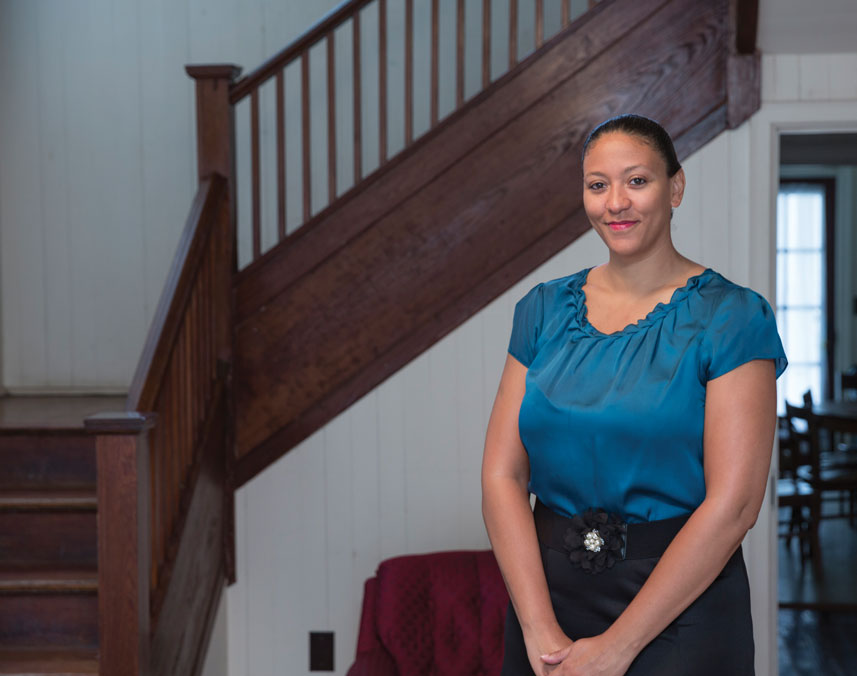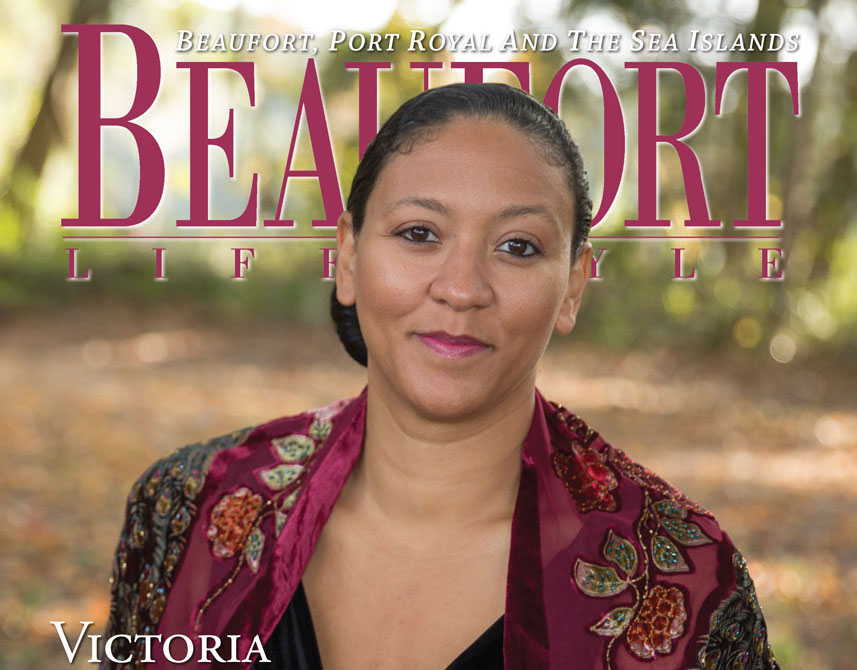A Heart for History
 “Let your deeds be your adornment.”
“Let your deeds be your adornment.”
– Victoria Smalls
Amid the whispering leaves of ancient oaks and billowing Spanish moss, an elegant woman with dark eyes and graceful stature strolls across the sacred grounds of Penn Center. Victoria Smalls, Director of History, Art and Culture is deeply rooted in the historic site. Born on St. Helena Island in 1970 to Elting B. and Laura Markovich Smalls, the first interracial couple on the island, Victoria lived a life of felicity and bliss in the midst of the Gullah culture. It would be years before her connection to Penn Center would come full circle.
Her father, a towering 6’6” charismatic man with a deep bass voice, met her mother during a Bahai conference at Penn Center in the 1960s. The Bahai Faith is a world religion that believes all religions, races, and people come from one God. Having graduated from Penn School in 1943, her father was a well-respected, beloved member of the Gullah community. Her mother, Laura, was a homemaker from Michigan who loved to paint with pastels. Due to the illegality of interracial marriages in South Carolina at the time, the couple married in Michigan. The newly blended family consisted of Laura’s four children and Elting’s six children, and would eventually grow to 18 children. Settling on St. Helena Island in the Tom Fripp community, Victoria’s upbringing was wrapped in layers of love like an old quilt. Despite the racial blending of the family, in an era where such unions were not overtly accepted, the Gullah community welcomed them with open arms.
Victoria’s exposure to the Gullah language from island residents and St. Helena Elementary school resulted in bilingualism. However, she soon sought to extinguish her vernacular when laughed at by some children while shopping in Beaufort. Her efforts to curtail her linguistic differences resulted in a stutter and a more subdued nature in an effort to hide her impediment.
But the wisdom of a respected Gullah community member, Mr. Gregory, a.k.a. ‘Buzzy,’ would ameliorate the situation. Immediately recognizing her problem, he offered young Victoria guidance. “You know you can get rid of that.” Continuing with sensitivity and compassion, “Think about what you will say before you say it. Sing your words.” Instantly she understood, and in less than a year, her speech was corrected.
Victoria attended South Carolina State University and University of South Carolina-Beaufort with a concentration in Early Childhood Education. As an artist, she painted and worked at The Red Piano Too art gallery with Mary Mack and hoped one day to own an art gallery featuring Gullah artisans. Nevertheless, fate would intervene. One afternoon as Victoria volunteered at Penn Center, she stood on the historic grounds glancing around and simply said, “Penn Center needs me.” Not long after she became Director of History, Art and Culture. “It was as if those who had gone before me heard my words. The words were so powerful it brought me to where I am.” She was finally home.
An American treasure, Penn School/Center was established more than 150 years ago to educate newly freed African Americans. Its rich history has very distinctive doctrines such as spirituality, strong character development, and learning a trade in order to compete on a national level. The school’s combination of academic advancement with the development of an industrial trade was very successful. The third component for self-sufficiency was land ownership, a philosophy many on the island embraced.
Victoria’s three children continue the Gullah legacy. Her eldest son, Christopher, a recent graduate of Winthrop College with a degree in Fine Arts, is a talented artist like his mother and grandmother before him. Her second son, Julian, a gifted student and talented football player, was “too rare and too beautiful for this world to keep.” Nine-year-old daughter, Layla, is vivacious and artistic, having already sold a piece of her art to an NFL player in Florida. Layla embodies all the love, compassion, and energy of her ancestry and will no doubt carry on family traditions.
Victoria shared fond memories of growing up on a farm in the Tom Fripp community. Whether playing with her siblings in the fields, picking blackberries for homemade cobbler, or fishing with her father in the ‘bateau,’ her childhood was charmed. “We harvested snap beans, peanuts, yams, watermelon, greens, tomatoes, cucumber, and lettuce. Mom blended warm bacon grease and crumpled bacon with lemon and poured it over salad. The greens would wilt ever so slightly from the heat and it was delicious.” With a glint in her eyes, she continued, “we shucked corn, ate half the blackberries we gathered before they made it to the cobbler, climbed trees to get pears for preserves, and had dirt fights in freshly plowed fields.”
In addition to the daily joys of growing up on St. Helena Island, Victoria also cherished many holiday traditions celebrated in the Gullah community. Although her family was of the Bahai Faith they participated in many festivities such as the annual Christmas tree lighting held at the Green, now known as MLK Park. Each year residents gathered to welcome the Christmas season with the lighting of the tree. Victoria and her family would pile into their green station wagon and drive to the park. Victoria watched intently as they approached hoping to catch a glimpse of the glowing lights even though the tree had yet to be lit. Attendees gathered about the tree singing Christmas carols and then as if by magic, the lights flickered on.
Another special event was the Mystery Play, a live Nativity scene, held annually at Penn Center since its inception in 1862. On the third Sunday of December, locals gathered to attend the Holy drama. Over the years members of Victoria’s family, from her father to her siblings to her son, have participated.
The Watch Night celebration commemorated the reading of the Emancipation Proclamation. Beginning at 11:00 pm on December 31st, the service welcomed in the New Year with prayers, the singing of spirituals and the recitation of the Emancipation Proclamation honoring those who struggled and perished for freedom. Although initially held on the Penn Center campus, Watch Night services are now hosted at local churches to better accommodate attendees.
Other customs included Christmas caroling and the giving of gifts wrapped in cloth. “Miss Gracie Reddecks used to give gifts of preserves or walnuts wrapped in cloth, a Gullah tradition. The fabric wrapping could then be used in a quilt or other sewing project.”
Gullah festivities were not limited to the Christmas season. Victoria has fond memories of Labor Day celebrations at The Green/MLK Park. Akin to a community fair, many congregated to sell produce, canned goods and hand-made items as well as participating in games and competitions such as checkers, ring toss, horseshoes and the greased pole climb. For years she watched boys endeavor to scale the slick surface to obtain the cash prize at the top. With her tomboyish nature, Victoria would not be overlooked. One year she entered the competition, winning the five-dollar prize, proudly beating all of the boys. Penn Center now hosts the annual event which includes a fish fry, music and traditional games. Sadly, the greased pole competition is no longer offered.
Working at Penn Center allows Victoria access to many historic documents and journals including one with signatures of Dr. Martin Luther King, Jr., Jesse Jackson and Andrew Young during the Civil Rights Movement. On the next page of the same journal she discovered signatures of those attending a Bahai conference in the late 1960s. One signature of great importance caught her attention, ‘Laura Markovich and her children.’ The inception of Victoria’s existence appeared in print before her very eyes. A photo of her father in his Penn School basketball uniform hangs in the museum providing her “with a wonderful sense of place.”
Victoria’s passion for Penn Center and the Gullah culture is evident. “No formal education could prepare me to be at Penn Center but my cultural upbringing and love of Gullah art and traditions did. The food, working the farm, fishing in the creek, getting hit in the head with a casting net, climbing pear trees, and picking blackberries; all these things prepared me to be in this place at this time. Penn Center was my playground. “
Victoria’s dream is for the Gullah language and customs to be taught in schools and universities around the world and that the words “I am Gullah Geechee” bring an enormous sense of pride. When asked what she loves most about her job, the reply was straightforward, “I get to share my love of the culture and my inner ‘Gullah Girl’ with the rest of the world.” Victoria’s passion for her island, community and family is unmistakable assuring that the Gullah legacy will live on.
Story by KIM POOVEY
Photography by PAUL NURNBERG


